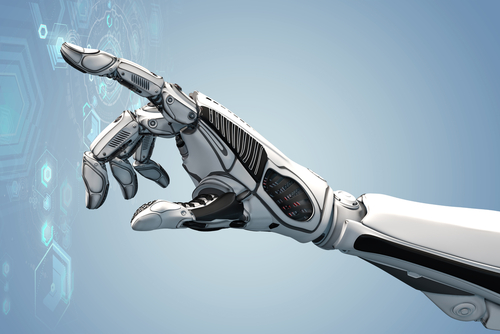AI: A Loyal Friend or the Worst Enemy?

This blog post will cover:
- The role of AI in the 21st century
- AI: does it have any relation to crypto?
- The risks of AI
- China AI program concerns FBI chief
- AI in the modern world: friend or foe?
Artificial intelligence (AI) has long been a buzzword across industries over the past couple of decades.
AI has been associated with the future before — but as we enter 2023, artificial intelligence and machine learning have evolved into linchpins serving as modern-day bulwarks of life as we know it. From transportation, robots, search engines, image recognition and translation, AI is so well and truly entrenched in our daily routines we don’t even notice it’s there. Modern life is without a doubt primarily driven by technology — so much so that AI is no longer in the realm of the phantasmagoric.
Regardless of where you stand as far as AI being a boon or a curse to humanity is, it’s there. But the concerns are real. We’ll take a closer look at the role of artificial intelligence in modern life as we know it today, how it relates to cryptocurrencies and distributed ledger technologies, and the worries surrounding its potential.
The role of AI in the 21st century
The term “artificial intelligence” was first coined in the early 50s. As with most technologies, its first uses were limited strictly to the military-industrial complex — that of governments, three-letter agencies, and national defense. It was only at the turn of the 2010s did AI truly blossom into more widespread enterprise and business adoption.
However, even as the technology has itself matured by leaps and bounds since the first AI-enabled app was written in 1951 by Christopher Strachey, it remains difficult to predict exactly how artificial intelligence will pan out — especially with how it’s being implemented in newer industry segments such as blockchain and cryptocurrencies.
Nevertheless, artificial intelligence has since evolved and branched out into subfields like machine learning, neural networks/deep learning platforms, decision management, virtual agents, and natural language processing — all of which complement each other across a universe of enterprise, commerce, social, and sovereign/governmental applications.
Early AI adaptation is working behind the scenes of online search, e-commerce, search engine algorithms, machine translations, smart devices, automated transportation, and cybersecurity using vast tracts of data mined from user actions, input, and data.
Here are several key areas where artificial intelligence is being leveraged on a daily basis:
- Retail. AI enables sales and business development professionals to effectively forecast, predict, and formulate a strong pitch before potential clients even know about the product. Decision management, on the other hand, enables businesses to maintain inventory at optimal levels without hindering capital flows.
- Banking and financial services. Every core area of banking and financial institutions, such as retail and institutional banking, as well as investment banking and wealth management all leverage AI to streamline and optimize customer service, diminish the incidence of fraud and risks arising from large transactions, and help banks to stick to constantly-changing regulatory requirements.
- Healthcare. Machine learning and natural language processing, both AI subfields, allow the medical industry to gather pertinent insights to create affordable, precise medical solutions and diagnoses for patients. One example is wearable tech which relies heavily on AI.
- Manufacturing. AI has enabled manufacturing companies of all sizes to resolve problems involving cost reduction, time to market, quality and inventory management. Using data gathered from every step of the customer journey — which is then fed into AI-enabled systems — companies can make better, more insightful decisions.
AI: does it have any relation to crypto?
Like artificial intelligence, distributed ledger technologies and cryptocurrencies are disrupting industries. Financial institutions, for instance, routinely harness AI to process huge amounts of data to promote innovation, streamline and automate tasks, and gain deeper insights.
Distributed ledger (blockchain) technology acts as a decentralized, transparent, secure, and immutable storage, while AI processes massive amounts of data in a centralized, siloed, and opaque manner.
That’s what makes these completely different technologies a perfect match: AI is compartmentalized and prone to privacy breaches, but distributed ledger technologies complement it with privacy, ownership, and integrity. They address each other’s inherent weaknesses.

The risks of AI
We aren’t at the level of extremely intelligent machines just yet — but the far-ranging legal, societal, regulatory, political, and financial consequences can be extremely challenging that we need to manage our expectations about the potential risks AI could bring in its current state.
For instance, the massive amounts of data AI can process can lead to security or privacy breaches. Big amounts of personally identifiable information can be utilized for nefarious purposes. Moreover, since it’s possible to collect that much data about users, it’s entirely possible that phone conversations or contents can be used to discriminate in the future.
On the other hand, the Cambridge Analytica debacle showed us how easily AI can be leveraged to manipulate social media, as the company allegedly used data from 50 mln Facebook users to influence the outcome of the 2016 US elections and the Brexit referendum through propaganda and bot networks.
Perhaps the most contentious use of AI is in the realm of military and ordnance applications, as they can be developed as autonomous weapons literally programmed to murder. This could trigger a far-ranging arms race with potentially disastrous consequences — especially when the tech falls into the wrong hands.
China AI program concerns FBI chief
No less than FBI Director Christopher Wray expressed deep concern about the Chinese government’s AI program, which he alleges was built on intellectual property and sensitive data that Beijing has stolen over decades.
Speaking at the World Economic Forum in Davos, Switzerland, Wray expressed fear that the Chinese government may export their hacking and data mining programs to other countries, advancing repression in other states and weaponizing AI for ends detrimental to the United States. He also mentioned the data processed by autonomous modes of transportation and how it can be detrimental to the rest of the citizenry.
AI in the modern world: friend or foe?
AI isn’t some distant future — we already exist in a world underpinned by artificial intelligence. It’s everywhere as it is. Nevertheless, there are no guarantees that these automated systems are safe enough for now.
Despite the advances it has made, artificial intelligence as a technology remains thoroughly fragile. Machine learning and AI-enabled systems are easily broken and prone to performing contrary to their intended purpose. Such errors arising from AI misconfigurations can cause tolerable or inconvenient problems at best, but in high-pressure situations, it can be quite dangerous.
Ultimately, any technology has the potential to be misused. As it stands, artificial intelligence has been used for the greater good of society as we harness it to make better diagnoses, build safer cards, and find ways to treat illnesses.
It’s up to us to find ways to prevent full-scale artificial intelligentization of military weapons and ensure that the reins of power are always within the scales of humanity — and the conversation has to be had post-haste. The potential of AI is truly huge, and it should be wisely used.

